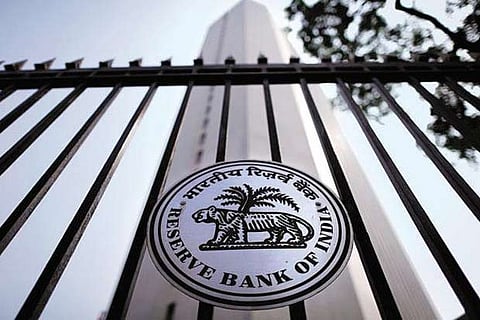

Mumbai
While industry body CII has been very vocal against the new norms that mandate joint audit and also cap the tenure at three years among many other restrictions on large players, domestic auditors and independent observers have welcomed the same saying the new circular issued on April 26 will go a long way in levelling the field for all by curtailing the brute dominance of the handful few.
''We have received representations from various stakeholders seeking clarifications, which are being examined and shortly we will come out with those clarifications,'' RBI Deputy Governor MK Jain told reporters at the customary post-policy presser. Without disclosing what are the key concerns raised in those clarifications, the central bank hinted that they are just clarifications.
''But the larger objectives of these regulations are to put in place ownership-neutral regulations, ensuring the independence of auditors, avoiding conflict of interests and improving the quality of audit.
''One should also see these measures as part of the RBI's efforts to strengthen the functions of the entities under its regulations,'' Jain said, implying there is not rethink of the restrictions announced. The new norms bring large non-banks and housing finance companies, and urban cooperative under its purview when it comes to appointing statutory auditors and the new norms will be effective from this fiscal. However, non-deposit taking NBFCs with asset size below Rs 1,000 crore can continue with their extant procedure.
The guidelines provide necessary instructions for appointment of Statutory Central Auditors (SCAs)/Statutory Auditors (SAs), number of auditors, their eligibility criteria, tenure and rotation etc, while ensuring the independence of auditors, the Reserve Bank said.
Banks and UCBs will be required to take prior RBI approval to appoint/reappoint SCAs/SAs on an annual basis, the guidelines said, adding for entities with an asset size of Rs 15,000 crore, audit should be conducted under joint audit of a minimum of two audit firms. All other entities should appoint a minimum of one audit firm for conducting statutory audit.
''It shall be ensured that joint auditors of the entity do not have any common partners and they are not under the same network of audit firms. Further, the entity may finalise the work allocation among SCAs/SAs, before the commencement of the statutory audit, in consultation with their SCAs/SAs,'' it said.
The guidelines further said to protect the independence of the auditors/audit firms, entities will have to appoint the SCAs/SAs for a continuous period of three years, subject to the firms satisfying the eligibility norms each year.
After CII publicly requested the RBI to have a relook at the norms the apex local auditors body ICAI had publicly backed the policy saying the new norms will help enhance audit quality, transparency, add value. Many independent auditors also questioned the concern that joint audit will increase cost and also suspecting the ability of domestic audit firms to audit large companies as nothing but nonsense.
It is reported that as many as 645 audit firms today meet the eligibility criteria for appointment as statutory central auditors for PSBs as empanelled by the CAG but none can do under the present norms but under the present regime none of them are working for them.
Some of independent auditors are also of the view that concerns such as cost escalation in terms of compliance with the new norms in a way questions the quality of smaller firms without giving them a chance.
''If audit is considered a cost, then the best way forward is not to go for an audit,'' Ved Jain, a former president of the Institute of Chartered Accountants (ICAI), had said earlier this week.
''Regulatory compliance is part of the business and good audit adds to value to the business and the process is value accretive and not a waste of resources,'' he added and pointed out that good audit mitigates risks and said those who suspect the quality and ability of smaller local audit firms should remember Saytam Computers, IL&FS, DHFL, Yes Bank and many other scams in our own backyard and the Enrons and the Lehmans of the Western world.
Amarjit Chopra, an ex-president of ICAI, said if at all there is a cost escalation of say 10-15 per cent due to employing joint auditors, it will get neutralised over time. After all, he said an audited entity can ask joint auditors to divide both the job and the fee, which will in turn make auditor become more competitive.
''Anyone saying joint audit does not work is a myth and that joint auditing will add to the cost nothing but nonsense. See, SBI has 14-odd joint auditors, are they paying 14 times more than those with one auditor, and BoI, UBI and PNB employ four-five auditors each. So higher cost is a myth and sheer humbug,'' Chopra had said.
ICAI president Nihar N Jambusaria had on May 26 said the new norms would enhance ''auditor independence and strengthen corporate governance,” and observed that currently, only 10 per cent of the eligible audit firms are appointed as statutory central auditors and with the relaxed norms, the number of eligible firms is expected to increase by three times.
Noted chartered accountant and Chairman of the Mumbai-based Shailesh Haribhakti Associates, Shailesh Haribhakti said the steps taken by RBI will bring in more transparency by avoiding collusion among auditees and auditors.
''This will also help bring out true and fair reporting of the financial health and performance of auditees apart from effectively opening the doors for domestic audit firms to have a level-playing field vis-a-vis their global peers,'' he said.
Visit news.dtnext.in to explore our interactive epaper!
Download the DT Next app for more exciting features!
Click here for iOS
Click here for Android